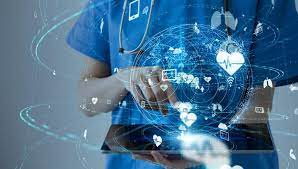Artificial Intelligence in Healthcare
- Mar 18, 2022
- 2 min read
During recent years, there has been a surge in the use of artificial intelligence within the healthcare industry by providing simple services are performing complicated surgical procedures on a patient. The rise of AI within the healthcare industry has caused many people to debate that doctors might be replaced by computers or robots in the near future but it has also aided doctors in diagnoses as well as treatment options.
For example within the treatment of cancer, there have been new breakthroughs that determine the specific diagnoses of a tumor and predict possible treatment options for enough data to form a pattern.
Taking this pattern that emerged from the numerous amounts of data that was collected by the software, when it was fed a new type of tumor it was able to categorize it into a certain diagnosis, and treatment options for them could be prescribed from there.

While this technology is far from being used widely in hospitals yet, it is still a very prominent aspect of healthcare and treatment that needs to be looked into to avoid human error when it comes to diagnosing patients and such.
The use of AI within the healthcare community has sometimes been frowned upon because they are unable to provide the empathy that human doctors can provide. However, shortly it is not plausible that AI fully replaces doctors but it is very likely that more technological equipment will be functioning with new AI that can detect various types of diseases when given enough data to make a safety report.
Within Johns Hopkins University is housed one of the five Da Vinci Machines, a completely mechanized surgical robot that can perform many complicated surgeries by itself without the need for doctors. While the Da Vinci machine does not provide medical advice or diagnose itself, it does perform surgeries that can are invasive and can perform accurately.
Robot-assisted surgery has become one of the most looked into fields of medicine in recent years due to the growth of AI and its interlinkages with almost every field, including medicine. With the growth of new machines and technology that can even detect cancerous cells in a person's body, it has become even more imperative in the growing digital world to embrace AI within medicine and use it to assist medical professionals in the field.
Even though they are not new technology, scanners like MRI, CT, and X- rays we're the first use of AI within the medical field, and they are periodically being modernized and used within the medical field. The growth of these technologies might never actually end up replacing doctors fully, but it has and will continue to play a significant impact on the field of medicine.



Comments